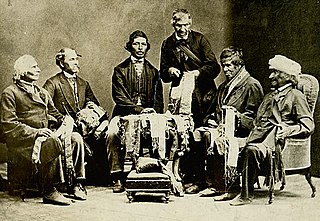
Capitalism is an economic system based on the private ownership of the means of production and their operation for profit. Central characteristics of capitalism include capital accumulation, competitive markets, price systems, private property, property rights recognition, voluntary exchange, and wage labor. In a market economy, decision-making and investments are determined by owners of wealth, property, or ability to maneuver capital or production ability in capital and financial markets—whereas prices and the distribution of goods and services are mainly determined by competition in goods and services markets.
A utopia typically describes an imaginary community or society that possesses highly desirable or near-perfect qualities for its members. It was coined by Sir Thomas More for his 1516 book Utopia, which describes a fictional island society in the New World. It can also refer to an intentional community.

Anti-capitalism is a political ideology and movement encompassing a variety of attitudes and ideas that oppose capitalism. In this sense, anti-capitalists are those who wish to replace capitalism with another type of economic system, such as socialism or communism.

Christian communism is a theological view that the teachings of Jesus compel Christians to support religious communism. Although there is no universal agreement on the exact dates when communistic ideas and practices in Christianity began, many Christian communists argue that evidence from the Bible suggests that the first Christians, including the Apostles in the New Testament, established their own small communist society in the years following Jesus' death and resurrection. Many advocates of Christian communism and other communists, including Karl Kautsky, argue that it was taught by Jesus and practised by the apostles themselves. This is generally confirmed by historians.
Left-libertarianism, also known as left-wing libertarianism, or social libertarianism, is a political philosophy and type of libertarianism that stresses both individual freedom and social equality. Left-libertarianism represents several related yet distinct approaches to political and social theory. Its classical usage refers to anti-authoritarian varieties of left-wing politics such as anarchism, especially social anarchism, communalism, and libertarian Marxism, collectively termed libertarian socialism. A portion of the left wing of the green movement, including adherents of Murray Bookchin's social ecology, are also generally considered left-libertarian.
Post-capitalism is, in part, a hypothetical state in which the economic systems of the world can no longer be described as forms of capitalism. Various individuals and political ideologies have speculated on what would define such a world. According to classical Marxist and social evolutionary theories, post-capitalist societies may come about as a result of spontaneous evolution as capitalism becomes obsolete. Others propose models to intentionally replace capitalism, most notably socialism, communism, anarchism, nationalism and degrowth.

Harry Brighouse is a British political philosopher at the University of Wisconsin–Madison. His research interests include the relationship between education and liberalism. His work on this topic has been widely cited by broadsheet newspapers, such as The Independent, and The Guardian.

Joel Edwards Rogers is an American academic and political activist. Currently a professor of law, political science, public affairs and sociology at the University of Wisconsin–Madison, he also directs the Center on Wisconsin Strategy and its projects, including the Center for State Innovation, Mayors Innovation Project, and State Smart Transportation Initiative. Rogers is a contributing editor of The Nation.

Ellen Meiksins Wood was an American-Canadian Marxist political theorist and historian.
Social democracy is a political, social, and economic philosophy within socialism that supports political and economic democracy. As a policy regime, it is described by academics as advocating economic and social interventions to promote social justice within the framework of a liberal-democratic polity and a capitalist-oriented mixed economy. The protocols and norms used to accomplish this involve a commitment to representative and participatory democracy, measures for income redistribution, regulation of the economy in the general interest, and social welfare provisions. Due to longstanding governance by social democratic parties during the post-war consensus and their influence on socioeconomic policy in Northern and Western Europe, social democracy became associated with Keynesianism, the Nordic model, the social-liberal paradigm, and welfare states within political circles in the late 20th century. It has been described as the most common form of Western or modern socialism, as well as the reformist wing of democratic socialism.
Far-left politics, also known as the radical left or extreme left, are politics further to the left on the left–right political spectrum than the standard political left. The term does not have a single, coherent definition; some scholars consider it to represent the left of social democracy, while others limit it to the left of communist parties. In certain instances—especially in the news media—far left has been associated with some forms of authoritarianism, anarchism, communism, and Marxism, or are characterized as groups that advocate for revolutionary socialism and related communist ideologies, or anti-capitalism and anti-globalization. Far-left terrorism consists of extremist, militant, or insurgent groups that attempt to realize their ideals through political violence rather than using democratic processes.
Robert Paul Brenner is an American economic historian. He is a professor emeritus of history and director of the Center for Social Theory and Comparative History at UCLA, editor of the socialist journal Against the Current, and editorial committee member of New Left Review. His research interests are early modern European history, economic, social and religious history, agrarian history, social theory/Marxism, and Tudor–Stuart England.

While Karl Marx and Friedrich Engels defined communism as a political movement, there were already similar ideas in the past which one could call communist experiments. Marx himself saw primitive communism as the original hunter-gatherer state of humankind. Marx theorized that only after humanity was capable of producing surplus did private property develop.
Cyber-utopianism or web-utopianism or digital utopianism or utopian internet is a subcategory of technological utopianism and the belief that online communication helps bring about a more decentralized, democratic, and libertarian society. The desired values may also be privacy and anonymity, freedom of expression, access to culture and information or also socialist ideals leading to digital socialism.
The theory of historical trajectory is part of Karl Marx's historical materialism. This theory has been analyzed by Erik Olin Wright, whose work has been cited in relation to it.

Erik Olin Wright was an American analytical Marxist sociologist at the University of Wisconsin–Madison, specializing in social stratification and in egalitarian alternative futures to capitalism. He was known for diverging from classical Marxism in his breakdown of the working class into subgroups of diversely held power and therefore varying degrees of class consciousness. Wright introduced novel concepts to adapt to this change of perspective including deep democracy and interstitial revolution.
Ethical socialism is a political philosophy that appeals to socialism on ethical and moral grounds as opposed to consumeristic, economic, and egoistic grounds. It emphasizes the need for a morally conscious economy based upon the principles of altruism, cooperation, and social justice while opposing possessive individualism.

Utopian socialism is the term often used to describe the first current of modern socialism and socialist thought as exemplified by the work of Henri de Saint-Simon, Charles Fourier, Étienne Cabet, and Robert Owen. Utopian socialism is often described as the presentation of visions and outlines for imaginary or futuristic ideal societies, with positive ideals being the main reason for moving society in such a direction. Later socialists and critics of utopian socialism viewed utopian socialism as not being grounded in actual material conditions of existing society. These visions of ideal societies competed with revolutionary and social democratic movements.
Interstitial revolution is a theoretical means of societal transformation through progressively and strategically enlarging spaces of social empowerment. Interstitial revolution builds on the concept of prefigurative politics which has a long history in anti-capitalist thinking, going back nearly two hundred years in the anarchist tradition. Prefigurativism is neatly summed up by the early twentieth century Constitution of the Industrial Workers of the World which declared: "By organizing industrially we are forming the structure of the new society within the old."
Andrew Levine was an American political philosopher and commentator. After acquiring his PhD at Columbia University in 1971, he taught at the University of British Columbia and then at the University of Wisconsin- Madison where he taught for thirty years. In retirement, he served as a research professor at the University of Maryland-College Park and as senior scholar at the Institute for Policy Studies, and he wrote as a news commentator for CounterPunch.org.











